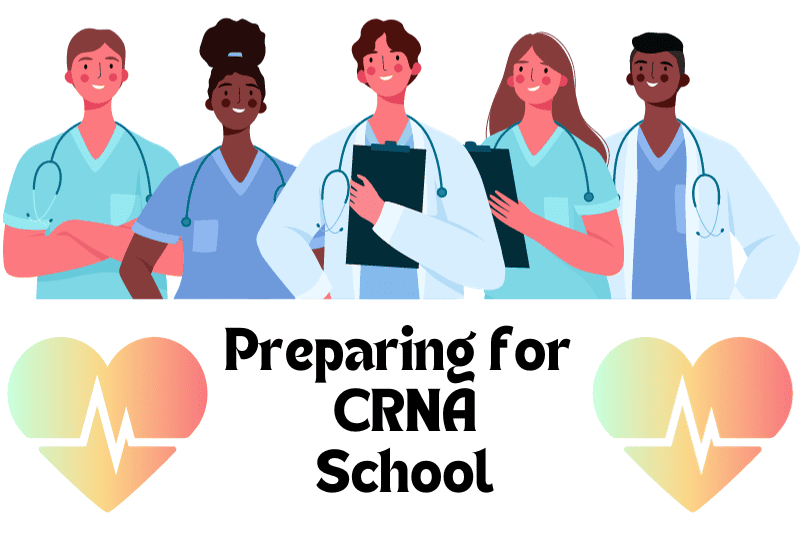
When to Apply to CRNA School
Making the decision to apply to CRNA School is a huge monumental step for your Nursing career. When exactly is the right time to apply and how will I know?
Whether you are a Nursing student just exploring the different career options or you are a seasoned ICU Nurse, this short little guide will help you decide when to take that crucial leep of applying so that you can idenify your perfect timing so that you have the best chance at success of becoming a Certified Registered Nurse Anethesist (CRNA).
The Importance of Timing
Timing is everything when it comes to applying to CRNA School. The right timing allows you to meet critical application deadlines and face less competition, increasing your chances of acceptance.
There are 3 areas to consider when you should apply to a CRNA Program.
- Your Personal Life
- Your Academic Life
- Your Professional Life

Lets go into detail a little more on each one of these areas:
Personal Life
Your personal life includes a lot of areas and many of those areas over lap each other. Relationships, finances, family and social life all intertwine and can play a huge role in you being ready to apply to Anesthesia School or even being able to make it though school.
Family and relationships often play a crucial role in a student’s ability to navigate through CRNA School successfully.
I recall vividly, at the outset of my Anesthesia School journey, one of the first warnings we received was about the high likelihood of marital strain or divorces among students, primarily due to the intense demands of the program.
The rigors of Anesthesia Programs are challenging enough on their own, and lacking support from family can heighten these challenges. It’s beneficial to have a candid discussion with your family, emphasizing that this endeavor requires sacrifices not just from you, but from them as well.
There will be countless days and nights dedicated to studying or being at the hospital, which means less time spent at home.
When to apply for CRNA school can be significantly influenced by the preparedness and support of your family. Once you’ve had open conversations with your loved ones about the demands and sacrifices involved in pursuing this path, and you sense their understanding and support, it can be a clear indicator that it’s the right time to move forward.
Family preparedness for the journey ahead is crucial, as their backing not only eases the personal challenges you’ll face but also provides a solid foundation of emotional support essential for succeeding in the rigorous CRNA program.
Are you financially prepared to go to CRNA School?
As you set your sights on CRNA School, one critical aspect that often goes unaddressed is financial preparedness.
The cost of attending a CRNA program varies widely – from being completely funded (as in the case of military programs) to exceeding $180,000. One thing that is very essential to understand is that the cost of tuition doesn’t necessarily correlate with the quality of education you may receive.
Don’t forget to consider the difference between an in-state school versus an out-of-state school because the tuition can vary significantly and have a huge impact on the affordability of the school you desire.
When planning your budget for CRNA school, it’s not just the tuition you need to account for. There are many additional expenses like housing, food, and general living costs are equally important. These expenses can add up quickly and should be factored into your total financial plan.
It’s also crucial to remember that each school may have different fee structures and additional costs, so thorough research and planning are key to understanding the full financial commitment required.
Working While Studying: Is It Feasible?
A common question among prospective CRNA students is whether they can work during the program to help cover expenses. Most CRNA schools advise against working while enrolled due to the demanding nature of the program.
All programs include extensive clinical hours and rigorous academic study, leaving little time for employment. While some students manage to work part-time, typically in ICU settings, balancing work and study often proves challenging and can negatively impact academic performance.
Starting to save early for your CRNA education is vital.
Many programs require a deposit to secure your place upon acceptance, and this is just the beginning of the expenses. Engaging with a financial counselor at the school can provide insights into various funding options available. They can assist in exploring loans and grants tailored for educational purposes, including ones that cover both tuition and living expenses. Being well-informed about these options is crucial for effective financial planning.
Minimizing Debt: A Strategy for Long-term Success
A common piece of advice from current CRNAs is the importance of minimizing debt during your education. The less you borrow, the better your financial situation will be when you start your career as a CRNA.
This approach not only eases the financial burden post-graduation but also contributes to a more stress-free learning experience.
Planning your finances, seeking scholarships, and understanding loan options are all part of a strategic approach to managing the cost of CRNA school.
This financial foresight is not just about making it through school but also about setting a solid foundation for your future career in nurse anesthesia.

Professional Life
Preparing professionally for CRNA school encompasses more than just academic qualifications; it requires substantial practical experience, particularly in intense settings like the Intensive Care Unit (ICU).
For admission into most CRNA programs, candidates are expected to have acquired significant ICU experience, usually around 1-2 years of full-time work. This requirement is critical as it provides aspiring CRNAs with the essential skills and insights necessary for managing the intricacies of anesthesia care.
ICU experience offers exposure to high-stakes patient care scenarios, critical decision-making skills, and familiarity with sophisticated medical equipment, all of which are fundamental for a nurse anesthetist.
Additionally, the time spent in the ICU is about more than just meeting a prerequisite; it’s about the quality of experience gained. Candidates for CRNA school need to show they can handle various critical situations, including managing life-support systems, administering complex medications, and swiftly adapting to patients’ changing health statuses.
Professional preparedness is vital because it allows students to effectively blend their practical experiences with the advanced theoretical and clinical education provided in CRNA school.
Hence, gaining and excelling in ICU experience is an essential step for nurses aiming to become CRNAs, as it lays the groundwork for their advanced training and future success in this demanding yet fulfilling profession
Academic Life
Being Academically prepared is a cornerstone for those looking to enter CRNA school.
Academic preparation goes beyond simply having a nursing degree; it involves a focused approach to meeting specific prerequisites and excelling in key subject areas.
The fundamental academic requirement for CRNA school is a Bachelor’s Degree in Nursing (BSN), complemented by a solid GPA, often expected to be above 3.0. However, the competitive nature of CRNA programs means that higher GPAs are more favorably viewed.
Additionally, specific prerequisite courses are essential, typically including advanced sciences such as anatomy, physiology, microbiology, and pharmacology. These courses lay the groundwork for understanding complex medical concepts and procedures encountered in CRNA training.
Aside from the above prerequisites, many CRNA programs also require candidates to take the Graduate Record Examination (GRE). The GRE scores serve as an indicator of a candidate’s readiness for graduate-level education, assessing verbal reasoning, quantitative reasoning, and analytical writing skills.
Given the analytical and problem-solving nature of anesthesia practice, excelling in these areas can significantly bolster an application. Therefore, prospective students should plan to prepare for and take the GRE well in advance of their application, aiming for scores that meet or exceed the median scores of previously admitted students.
When considering the timing of applications, it’s crucial to be aware that CRNA schools typically have stringent deadlines. These deadlines can vary significantly from one institution to another.
Most programs start accepting applications at least a year before the intended start date, with some having specific cut-off dates for submission. Prospective students must research the application timelines of their chosen schools carefully and plan accordingly.
This involves not only preparing for and taking the GRE but also ensuring that all prerequisite coursework is completed and that academic transcripts, letters of recommendation, and personal statements are ready for submission.
In summary, being academically prepared for CRNA school entails a strategic approach to education, focusing on relevant coursework, achieving a strong academic record, and successfully navigating standardized testing like the GRE.
Coupled with this is the need for careful planning around application timelines, ensuring that all requirements are met and application materials are submitted within the specified deadlines.
Meeting these academic criteria is key to not only gaining admission into a CRNA program but also laying a strong foundation for the rigorous and rewarding journey of becoming a Certified Registered Nurse Anesthetist.
Determining the ideal time to apply for CRNA School is a critical step in advancing your nursing career.
It involves balancing personal, professional, and academic aspects of your life. Ensuring your family understands and supports the sacrifices involved, gaining relevant professional experience in settings like the ICU, and meeting academic prerequisites are all key to preparing for this journey.
Remember, applying for CRNA school requires not just meeting critical deadlines but also being ready in all aspects of your life.
With thoughtful preparation and support, you can identify the best time to apply, setting yourself up for success in becoming a Certified Registered Nurse Anesthetist.
